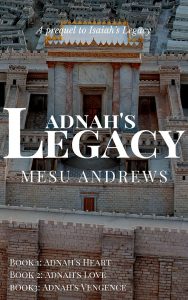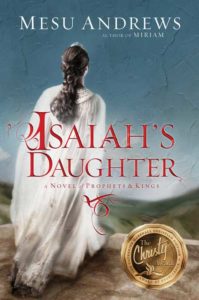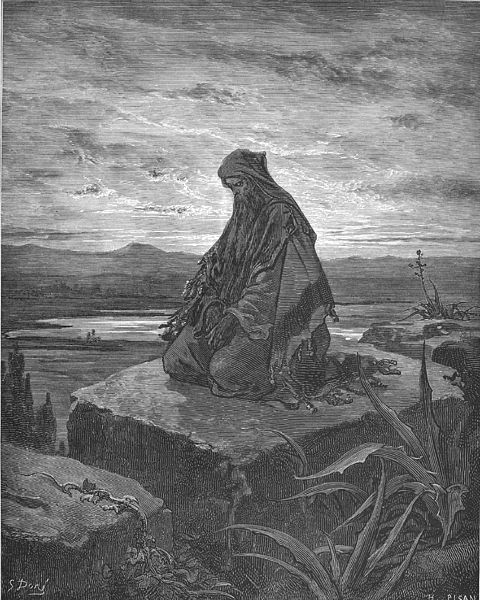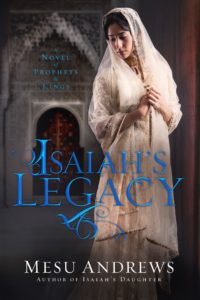Fact Or Fiction – Isaiah’s Legacy
TRUTH: Manasseh’s Parents
Isaiah’s Legacy explores the life of King Manasseh, Judah’s wickedest and longest-reigning king. He was the son of King Hezekiah, the most righteous king of Judah, and his wife, Hephzibah.
“Hezekiah rested with his ancestors. And Manasseh his son succeeded him as king. Manasseh was twelve years old when he became king, and he reigned in Jerusalem fifty-five years. His mother’s name was Hephzibah.” 2 Kings 20:21-21:1
FACT: Manasseh & Isaiah
Rabbinic literature and Jewish tradition document Manasseh’s mother, Hephzibah, as Isaiah’s daughter–which makes Manasseh Isaiah’s grandson. Hephzibah’s name appears twice in Scripture–Isaiah 62:4 and 2 Kings 21:1–though not in the context of Isaiah’s family.
 Isaiah’s Daughter is the first book in the Prophets & Kings series (the prequel to Isaiah’s Legacy). Though each book can stand alone, you’ll get a clearer picture of Judah’s history if you read them in order. CLICK HERE for more information about Isaiah’s Daughter (including a free, downloadable companion Bible study).
Isaiah’s Daughter is the first book in the Prophets & Kings series (the prequel to Isaiah’s Legacy). Though each book can stand alone, you’ll get a clearer picture of Judah’s history if you read them in order. CLICK HERE for more information about Isaiah’s Daughter (including a free, downloadable companion Bible study).
There’s also a free novella called, Adnah’s Legacy, that links the two stories (to be read between the two books) that you can CLICK HERE to download.
CLICK HERE to read my blog post, Who Is Hephzibah (the most-visited page on this website) for a more thorough biblical exploration of her character.
 TRUTH: Isaiah’s Family
TRUTH: Isaiah’s Family
Much of what we know about the rest of Isaiah’s family is recorded in the Bible:
“Then the Lord said to Isaiah, ‘Go out, you and your son Shear-Jashub, to meet Ahaz at the end of the aqueduct of the Upper Pool, on the road to the Launderer’s Field.’” Isaiah 7:3 (emphasis added)
“The Lord said to me, ‘Take a large scroll and write on it with an ordinary pen: Maher-Shalal-Hash-Baz.’ . . . Then I made love to the prophetess, and she conceived and gave birth to a son. And the Lord said to me, ‘Name him Maher-Shalal-Hash-Baz. For before the boy knows how to say, “My father” or “My mother,” the wealth of Damascus and the plunder of Samaria will be carried off by the king of Assyria.’” Isaiah 8:1-4 (emphasis added)
You can find out more about Isaiah’s family on the Fact Or Fiction Page for Isaiah’s Daughter.
TRUTH: Manasseh’s Reign
Manasseh was only twelve years old when his righteous father died (2 Kings 21:1). A tender age to take on the responsibility of ruling a nation. He likely had royal counselors to advise him, but ultimate authority was in his hands at the traditional age of manhood in ancient Judah–twelve years old.
“He rebuilt the high places his father Hezekiah had demolished; he also erected altars to the Baals and made Asherah poles. He bowed down to all the starry hosts and worshiped them . . . In both courts of the temple of the Lord, he built altars to all the starry hosts. He sacrificed his children in the fire in the Valley of Ben Hinnom, practiced divination and witchcraft, sought omens, and consulted mediums and spiritists.” 2 Chronicles 33:3–4, 6 (emphasis added)
FACT: Manasseh’s Intellect

Published by Guillaume Rouille(1518?-1589), Public domain, via Wikimedia Commons
In Jewish history, Manasseh is said to have possessed “a profound knowledge of the Torah and could interpret Leviticus in 55 different ways” (Sanh. 103b).
Another story is told about Rabbi Ashi, who claims that King Manasseh appeared to him in a dream. Manasseh asked him a ritual question which Ashi could not answer, and Manasseh revealed the solution. When Rabbi Ashi asked how someone with such holy intellect had worshiped idols, Manasseh answered, “Had you lived at my time, you would have caught hold of the hem of my garment and sped after me” (Sanh. 102b).
I discovered these findings early in my research and pondered Manasseh’s unusually-gifted intellect. Could he have been a savant? So incredibly intelligent and with such a curious mind that “normal” men of his culture wouldn’t have understood the young boy on the throne?
FICTION: Why Did Manasseh Reject Yahweh?
Imagine Manasseh as an impressionable twelve-year-old whose father was dying. Might Manasseh have been angry when his father’s God–the God who had healed Hezekiah when Grandfather Isaiah prayed for him (2 Kings 20:1-11)–felt betrayed when Yahweh refused to heal Hezekiah in answer to Manasseh’s prayers?
Might a curious, intelligent, young king turn to other gods–especially gods who promised health and healing? Notice in 2 Chronicles 33:3-4 that Manasseh not only bowed down to the Baals and Asherah poles of the Canaanites, whose purpose was more connected to weather, agriculture, and fertility.
Manasseh also worshiped the starry hosts. Starry hosts were the Mesopotamian gods of Assyria and Babylon, the more powerful nations of his day. Based on astrology–the same horoscope symbols used today–these pagan deities coupled with dark arts and herbal remedies.
FACT: Isaiah’s Martyrdom

Gustave Doré, Public domain, via Wikimedia Commons
In every historical resource I consulted, the ugly fact remained consistent: Manasseh executed Isaiah–his own grandfather–by sawing him in two. However, Jewish tradition also records God’s miraculous care for His prophet during the execution by giving Isaiah a final prophetic word.
I included a similar hope in the brief execution scene (no gore), to remind God’s faithful that though sin and evil are ugly and inescapable, God’s presence and power can light our way through the deepest darkness.
FICTION: An Ancient King With Autism
Let me begin by saying I don’t believe autism made Manasseh an evil king. Everyone is broken in some way, with some marred condition inherited through our original parents, Adam and Eve.
Manasseh, like the rest of us, needed to be reborn with a new heart for Yahweh. Not because he had autism but because, at some point, he knew what was right and chose to do wrong–and led others to do the same.
“Moreover, Manasseh also shed so much innocent blood that he filled Jerusalem from end to end—besides the sin that he had caused Judah to commit, so that they did evil in the eyes of the Lord.” 2 Kings 21:16
My premise throughout the book was simple: What if Manasseh struggled in ancient days with ASD (Autism Spectrum Disorder) before the struggle was labeled or understood? I wrote Manasseh as a child who often retreated into his own world and a teenager unable to read facial expressions. As an adult, he considered himself a “friend” of Esarhaddon, King of Assyria, when in reality he was no more than a cog in Assyria’s war machine.
FACT: Manasseh Supported Esarhaddon

Terracotta record of king Esarhaddon’s restoration of Babylon. Courtesy of Trustees at the British Museum
On April 30, 2019, ten months before Isaiah’s Legacy released, WatchJerusalem Online featured an article entitled, Esarhaddon Prism Proves King Manasseh.
The picture at left is the “prism” described in the article, which lists King Manasseh as one of the kings who cooperated with the Assyrian king, Esarhaddon, and made the rebuilding of ancient Babylon possible during Esarhaddon’s reign.
Why is this important?
BIBLICAL scholars debated the authenticity of Scripture for years, suggesting that scribes had surely made an error when recording WHERE Manasseh was taken as a prisoner of war.
“The Lord brought against [Judah] the army commanders of the king of Assyria, who took Manasseh prisoner, put a hook in his nose, bound him with bronze shackles and took him to Babylon.” 2 Chronicles 33:11 (emphasis added)
Nineveh was Assyria’s capital. Why would the King of Assyria take Manasseh–or any other captive–to Babylon?
FACT: A Tale of Two Brothers

Louvre Museum, Public domain, via Wikimedia Commons
King Esarhaddon was the son of Sennacherib’s concubine, Naqia (sometimes called, Zakutu). She was a flamboyant character in history and in my imagination. When Esarhaddon died, the queen-mother issued a decree throughout the Assyrian Empire, threatening death to anyone disloyal to her FAVORITE grandson, Ashurbanipal, who she declared heir to the throne in Nineveh.
She also decided Esarhaddon’s second son, Shamash-shumukin, needed a throne of his own and reserved his seat on Babylon’s throne.
So Manasseh was taken, as Ashurbanipal’s Assyrian captive, to a Babylonian prison ruled by his brother, Shamash-shumukin’s. Why?
Dunno. But it helps explain the Truth in God’s Word . . .
TRUTH: God Gives Mercy To Prodigals
“In his distress he sought the favor of the Lord his God and humbled himself greatly before the God of his ancestors. And when he prayed to him, the Lord was moved by his entreaty and listened to his plea; so he brought him back to Jerusalem and to his kingdom. Then Manasseh knew that the Lord is God.” 2 Chronicles 33:12–13
Somehow, the timing of Manasseh’s repentance coincided with events in Assyrian/Babylonian history, making it possible for Manasseh to be released and returned to his throne in Jerusalem. God’s Truth always affirms the facts–we humans are simply slow in realizing sometimes. 😆
Why read my book, now that you know Manasseh’s story?
Because you haven’t yet met his wife, Meshullemeth! (Who I nicknamed, Shulle, in the novel so my readers wouldn’t have to pronounce her name over and over!)
TRUTH: Meshullemeth Bore At Least One Son
“Manasseh rested with his ancestors and was buried in his palace garden . . . And Amon his son succeeded him as king . . . His mother’s name was Meshullemeth daughter of Haruz; she was from Jotbah.” 2 Kings 21:18–19
Want More Truth, Fact, and Fiction?
I hope you’ve enjoyed this FACT OR FICTION page for Isaiah’s Legacy. If you haven’t yet read the book and would like to purchase your copy or learn more about it, CLICK HERE. And if you’re curious about the Truth that awaits you in God’s Word, check out 2 Kings 21 and 2 Chronicles 33. Happy reading!
*CLICK HERE for a downloadable list of all my books.
CLICK HERE to check out the FREE Companion BIBLE STUDY called, Manasseh: A 7-day Journey to a Life Unchained on the YouVersion Bible App!



